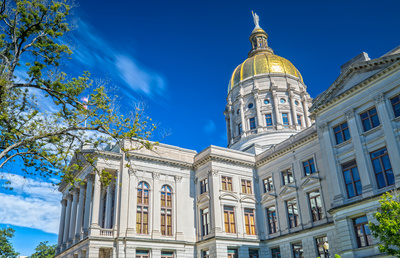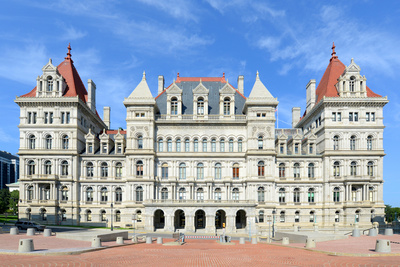To say that it has been a rocky budget year for states would be an understatement: revenues for this year have been lackluster overall and
projections for the future aren't any brighter. States across the country struggled to meet their requirements to pass balance budgets, but states most succeeded and came into the new fiscal year — which began July 1 for 46 states — with at least some kind of spending plan. Unfortunately, some states have not been as successful.
Today's post will discuss those states that are in the most immediate trouble, including those that have shut down after failing to pass a new appropriations bill. Later in the week we will look at states that haven't shut down but which face significant fiscal hurdles in the near future.
Illinois
With one vote to spare, the Illinois House passed an amended version of its budget bill (
IL SB 9), although Governor Rauner (R) has expressed his opposition in the strongest possible terms.
Over the weekend Illinois passed into its third official year without a state budget, which has caused many ratings agencies to threaten to downgrade the state's bonds to junk status. Amid this pressure, Speaker Madigan (D) rallied his troops behind amendments to the Senate's revenue plan (formerly the "Grand Bargain") in an attempt to demonstrate that budget negotiations were carrying on in good faith. He was ultimately successful, passing the bill on a vote of 72-45.
Like the original Senate version, the House bill would increase the corporate income tax to 7 percent from 5.25 percent and would increase the personal income tax to 4.95 from 3.75 percent. Unlike the Senate, however, the House abandoned a proposed expansion of the sales tax base (the original would have taxed personal care services, online streaming audio/video, and detective/security services, among others).
Exemplifying the kind of dire fiscal predicament the state is in at the moment, several conservative lawmakers ultimately voted for the bill, saying that they would rather see a tax increase than the shuttering of the towns that they represent.
Governor Rauner expressed his opposition to the bill after it passed Sunday, saying that the people of Illinois deserved better. Specifically, the governor chided lawmakers for not including his long sought after legislative priorities: a property tax freeze, reforms to the workers' compensation system, and state pension reforms.
It is unclear how the process will move forward from this point. Lawmakers on both sides of the aisle appear desperate to keep the state from falling into economic calamity, but there are currently not enough votes to overcome a potential veto.
Maine
We've been hearing since at least mid-June that the chances of a government shutdown were high, but on Monday morning those fears became a reality as Governor LePage (R) made the order after rejecting the legislature's budget proposal.
Tax policy has been at the center of the conflict between the governor and the legislature throughout the session and is one of the central causes of the shutdown. The first area of contention was whether lawmakers should overturn the voters' approval of
Question 2, which would levy a 3 percent surcharge on personal annual incomes over $200,000. The split ran along partisan lines, with Republicans arguing that the new tax would make the state less competitive and Democrats arguing the money was necessary to meet the state's financial commitments. For his part, the governor said he would veto any budget that increased taxes that were not also paired with income tax cuts.
Despite the weeks of controversy, budget negotiators were able to
forge an agreement that eliminated the tax and increased state education spending in exchange for a 1.5 percent hike to the state lodging tax. While LePage's own fiscal plan contained a proposal to increase the lodging tax, the governor said that he would stand firm on his no-tax pledge and allow the government to shut down rather than sign the new budget.
“Look, a shutdown is necessary for the future of Maine. That’s the way I look at it now,” LePage
told a local radio station just before to the shutdown. “It’s about the future. You can’t tax yourself to prosperity.”
New Jersey
Embattled Governor Christie (R) has started the Fourth of July holiday with a government shutdown after failing to come to a budget agreement with legislative leaders. The
central fissure is between legislative Democrats, who want to increase education spending, and the governor, who wants legislation granting the state greater control over health insurance funds to fight opioid abuse and legislation to use lottery funds to prop up the state pension fund.
The governor said he was willing to consider the education increase and Democrats were amendable to the lottery change — some said that they thought it just a budgeting gimmick — but the health insurance money was the sticking point. Christie's
proposal was to allow his office to funnel $300 million out of the Horizon Blue Cross Blue Shield of New Jersey (the state's largest insurance provider) reserves in order to fund his signature drug addiction diversion programs.
Speaker Prieto (D) refused to grant the governor access to these funds, saying it was a bad deal and that he would not be
extorted over the budget. The governor says that he is willing to sign off on a budget without the Horizon money but that he would respond by line-item vetoing
$325 million worth of Democratic spending priorities.
This standoff was further complicated on Sunday night when more than two dozen members of the Democratic caucus broke ranks with the Speaker Prieto and said that they would not support his budget proposal in the face of Governor Christie's veto threat.



